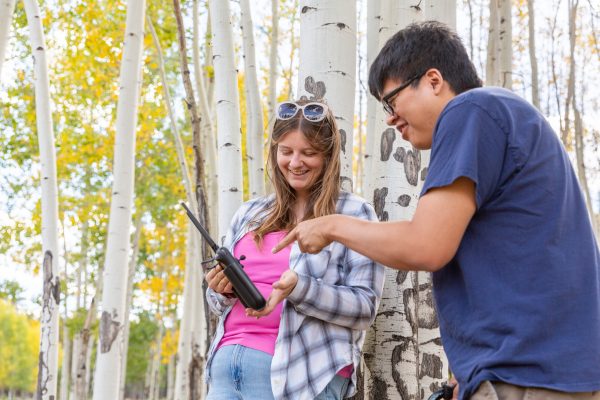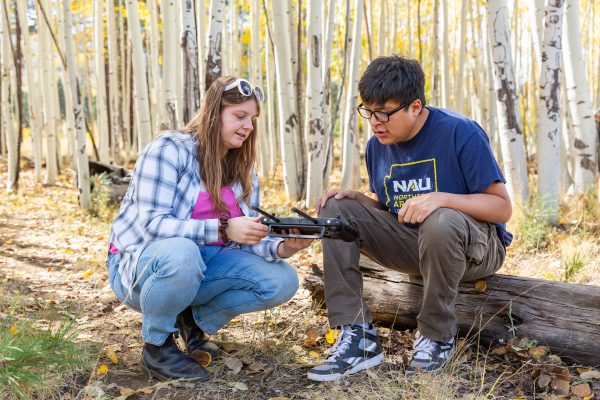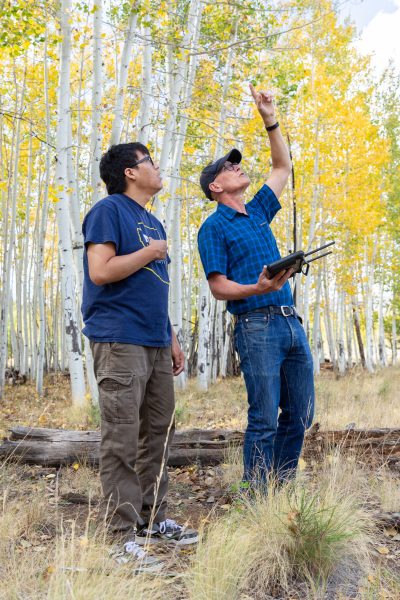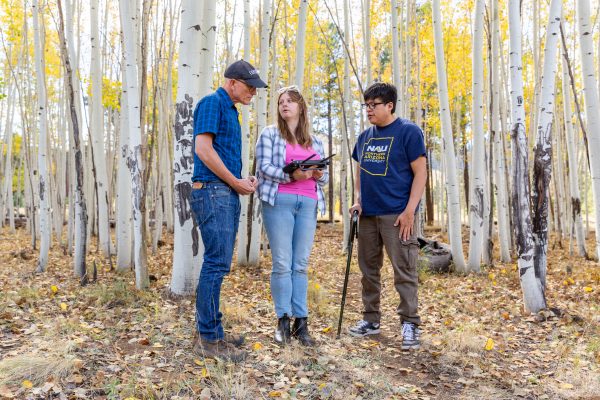On October 11, an undergraduate student with a disability in IHD’s Supporting Inclusive Practices in Colleges (SIP-C) program went on an inclusive field trip with NAU faculty. Their destination was Hochderffer Hills, a scenic area in the Coconino National Forest outside of Flagstaff, where they conducted a drone flight to view the aspens at their peak fall color. Below are some observations on this field trip by the faculty and graduate student involved.
Dr. Peter Z. Fulé
Regents Professor, School of Forestry

The inclusive field trip was a great opportunity for sharing a forest ecology experience with Kenny, an NAU student with a disability. The drone technology makes the world of the forest canopy accessible to everyone. The control system (joysticks) and video screen of the drone controller are nearly universally familiar and usable. As the drone moves overhead, all of the participants are united in the interest of seeing the trees from a perspective that none of us could attain individually, creating a level playing field for people of all abilities. With some pre-planning for access by vehicle and a short walk, and taking into consideration the weather, seating, snacks, and the total time involved, all of us shared a safe and comfortable experience in the forest while making use of state-of-the-art technology. We discussed the research goals of measuring the trees with different kinds of sensors, helping us describe the forest’s growth, while simultaneously appreciating the beauty of the aspens in the fall. This well-planned trip was a good first step for future inclusive field activities.
Dr. Sakénya McDonald
Assistant Director of Academic Programs, Institute for Human Development

The drone flight field trip speaks volumes about the power of interdisciplinary education, especially the ways in which it serves as a conduit for transforming the way we teach, learn, and explore careers. In my role, I actively seek opportunities for students in the Supporting Inclusive Practices in Colleges (SIP-C) program to participate in experiential learning. Students with intellectual disabilities are often excluded from important learning activities, such as field work. When we create avenues for this population of learners to engage in these activities alongside their non-disabled peers, we are acting to remove stigmas, biases, and barriers. Colleges and departments at Northern Arizona University are committed to inclusive excellence – for all students. Pete and Alyssa’s enthusiasm was evident from day one of the planning process. They incorporated Kenny’s accommodations into the plans from the beginning to the benefit of all participants. In our educational coaching sessions, Kenny expressed a reinvigorated interest in pursuing a career in forestry, a discipline he’d previously considered but felt was inaccessible to him. He is looking forward to touring the forestry lab in the spring.
Alyssa Sanderson
Graduate Student, School of Forestry
As the graduate student working on this field trip, I felt very grateful to have this opportunity to share my research. I enjoyed sharing my perspective with the student involved, and the proximity in age and interests between us made for a wonderful bonding experience. This was a fantastic opportunity to explain my research to someone outside my field while also giving me time to conduct necessary experiments and collect data. Working with both a professor and a student allowed me to assess my own knowledge and ability to explain concepts while simultaneously having support from those more experienced than me. Additionally, this field trip helped to inform me about the potential accessibility of remote sensing research and how this could possibly be implemented. Using tools like drones can help open up the world of ecological research to those who may not be able to access traditional fieldwork sites. As I move forward in my career and learn more about remote sensing technologies, I hope to incorporate inclusive outreach education and continuous learning opportunities for those interested. With so many new innovations happening in this type of work, it is exciting to consider the many collaborations that could occur. Overall, this field trip was a worthwhile and insightful experience for me, and I hope to participate in activities similar to this one throughout my research career.
